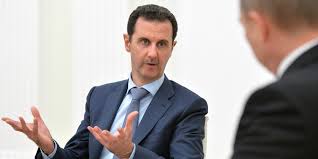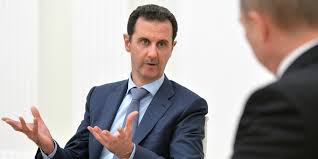
Keep up to date with Bro Don’s Snippets by registering at [email protected]. Just state if you would prefer word doc or pdf format.
Below is an extract from today’s release…
The Kremlin revealed Wednesday that Syrian President Bashar al Assad had made an unannounced visit to Moscow the previous evening, during which he met with his Russian counterpart, Vladimir Putin. During their meeting, which the Syrian side reportedly initiated, the two leaders discussed ongoing joint military efforts and future measures to reach a political settlement to the Syrian conflict.
Al Assad’s visit to Moscow is important for several reasons, not least of which is that it is allegedly the first time the embattled Syrian president has traveled abroad since conflict erupted there amid the Arab Spring in 2011. His visit suggests he felt he could return safely to Syria afterward: Al Assad probably would not have traveled abroad had he feared a coup or drastic military setbacks during his trip, suggesting a newfound confidence in his governance.
Of course, the destination of the Syrian leader’s first trip in four years is also significant. The visit comes as Russia has become militarily involved in the Syrian conflict. Moscow began airstrikes supporting the Syrian government at the end of September and has increased their volume and scope over the past few weeks. Al Assad acknowledged Russia’s military assistance in his meeting with Putin, saying without it the “terrorism that is spreading through the region now would have made even greater gains.” While Iran has long backed the al Assad government, the choice of Russia as the Syrian leader’s first visit can be seen as a sign that the al Assad government enjoys not just foreign support but the legitimacy that comes with backing from a major international player with a seat on the U.N. Security Council.
The significance of the trip was also notable for the reactions it sparked, making the future implications of the meeting as important as the fact that it happened at all. Shortly after the visit, Putin received phone calls from the leaders of Turkey and Saudi Arabia. Turkish Prime Minister Ahmet Davutoglu later said a political settlement could begin if al Assad “stayed in Moscow,” but nevertheless pressed a need to start a transition period, while Putin reportedly briefed Saudi King Salman on the results of the meeting. Russian Foreign Minister Sergei Lavrov also received a call from U.S. Secretary of State John Kerry following the visit. One of Moscow’s main motivations behind its military entry into the Syrian conflict was the desire to get other powers, particularly the United States, involved in discussions for a negotiated end to the conflict.
Talks on the Syrian crisis have now been scheduled between the top diplomats of Russia, the United States, Turkey and Saudi Arabia in Vienna on Oct. 23. Of course, actually striking a deal for a transition plan in Syria will prove harder than merely convening talks.
What is a Geopolitical Diary?
Many factors complicate the quest for a political solution to the conflict, not least of which are Syria’s deep divisions. The question of how Syria would transition from al Assad’s leadership will be key to the multilateral talks. Many of the rebels have refused to accept a settlement allowing al Assad’s rule to continue in any shape. The United States and Turkey, among others, are not happy at the prospect of al Assad even having a voice in any politically negotiated settlement.
Despite these obstacles to talks, al Assad’s meeting and the upcoming quadrilateral talks reveal important movement on the diplomatic front regarding the Syrian crisis. And if the Russian- and Iranian-backed efforts to stabilize al Assad’s forces and restore their advantage on the battlefield prove successful, Damascus will be in a much more favorable position at the bargaining table.


